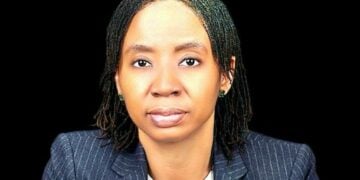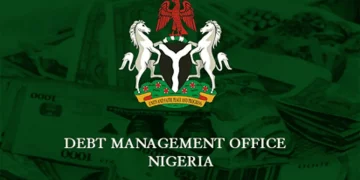Beyond helping to raise funds for the federal government to finance deficit in the national budget, the DMO has creditably extended its scope to supporting federal and sub-national governments to generate funds for infrastructure financing. MARK ITSIBOR writes
Even the most credible pundits and global economic/financial institutions like the World Bank and International Monetary Fund (IMF) could not have imagined that the economy was such vulnerable to global shocks; not the rating agencies either. Nobody expected the massive drop in revenues available to government orchestrated by the duo factors of nosedive in prices of oil at the international market and outbreak of Coronavirus pandemic that recked much havoc on the global economy – which Nigeria is directly tied to. Obviously, failure of previous administrations to save for rainy days in the home front exposed the Nigerian economy to avoidable shocks.
Without anticipation, the headwinds affected the present administration’s capacity to meet its financial obligations, despite the nation’s huge infrastructure deficit. Government’s effort to cut infrastructure deficit has been adversary affected. That combined to expose the economy to greater shocks, resulting in recession. Nigeria has witnessed economic shocks with major impact on revenue that have resulted in recession twice and borrowing was a major tool for reversing the trends.
There is the need to augment for the shortfall in government revenues and borrowing is the most viable option for government to raise funds for the deficits. Phrases such as debt transparency, fiscal deficit, debt burden, debt trap, default have become the subject of analysis on a daily basis.
DMO to the rescue
DMO came handy to help save the situation. It continues to play strategic role in ensuring the successful implementation of the national budgets through the financing of deficits. This role is better measured when it is realised that over 90 per cent of the deficits in the Annual Appropriation Acts over many years have been funded through borrowing. These borrowings are done by the DMO through a wide range of instruments.
The DMO under the leadership of its Director-general Ms Patience Oniha has played a key role through its borrowing operations is the development of the domestic fixed income securities markets. For instance, within the last 12 months, DMO has created access for Nigerian corporates in the International Capital Market.
As it stands, the DMO which was a child of necessity has emerged a major agency for the mobilization of the needed funds for the financing of public projects. At the last count, official document showed that the DMO has raised a total of $15.668 billion for the federal government to fund its budget deficit in a period of 10 years – from January 2011 to September 2021.
Through these securities’ issuance in the international capital markets, the sources of funding for the federal government had expanded while, it created opportunities for Nigerian corporates including banks to raise capital abroad. Perhaps, even more important, the proceeds of Eurobonds issued, increased Nigeria’s External Reserves thereby supporting the Naira Exchange Rate.
These have been achieved through various products: Nigerian Treasury Bills, FGN Bonds, FGN Savings Bond, Sukuk, Green Bonds, Eurobonds and a Diaspora Bond. In this important developmental role, the DMO has won a number of awards locally and international from credible organisations.
Under the 2021 fiscal year alone, the debt office has also helped to raise about 90% of domestic borrowing through FGN bonds and FGN Savings bonds to finance the deficit component of the 2021 appropriation Act. Another N250 billion was raised via Sukuk. What is outstanding is N345 billion. The federal government’s entrance into the international capital market – through the instrumentality of DMO – helped the government to raise $4 billion credit facility through its Eurobond issuance.
Borrowing was a major instrument used by the federal government to pull the nation’s economy out of recession twice. Nigeria exited recession in the fourth quarter after a positive GDP growth in 2020, its second annual contraction since 2016.
“The DMO’s activities are not limited to domestic financial markets. It may please you to note that the DMO has raised over $15.368 billion through Eurobonds and a $300 million Diaspora Bond to finance Budget deficits and various projects,” Director-general of the debt office said at a workshop for some members of the National Assembly recently. On the external front borrowing which is $6.18 billion, $4 billion was raised in September.
The DMO recognises that borrowing should be done with caution to meet developmental and sometimes, social needs, and that proceeds are deployed judiciously. But much energy should be paid to ways of revenue mobilization to reduce deficit in the national budget, thereby, cut borrowing.
Impacts of project-tied Sovereign Sukuks
Apart from that, the DMO had announced that it was going to raise N200 – N250 billion through issuance of another Sovereign Sukuk this year for the financing of critical road projects across the country. Since the debut Sovereign Sukuk in September 2017 whose benefit in terms of improved road infrastructure within and outside cities in Nigeria, the Sukuk has been commended as a viable instrument for financing infrastructure.
Obviously, the use of Sukuk, has enabled timely completion of the designated projects whilst also delivering the multiplier effects associated with construction of capital projects such as roads.
While Sukuk is transforming road infrastructure across the country, Nigeria became the first country in Africa and the fourth in the world to issue a Sovereign Green Bond. Through the issuance of these securities, the DMO has contributed immensely to the domestic financial markets and provided investment opportunities for local and foreign investors. The DMO commenced the issuance of Sukuk in September 2017 as a strategic initiative to support the development of infrastructure, promote financial inclusion and deepen the domestic securities market.
DMO redeems 6.75 person cent $500 million Eurobond
One of the activities that stood the DMO out in 2021 was the settlement of Nigeria’s 6.75 per cent $500 million Eurobond which matured on January 28, 2021 and was redeemed. Remarkably, funds were made available by the federal government to the fiscal agent to repay the principal sum of $500 million and final Interest payment due on the Eurobond.
By that singular development, Nigeria continues to demonstrate in practical terms, its commitment towards honouring all its debt service obligations as and when due.
The 6.75 per cent N500 million January 2021 Eurobond which was issued in January 2011 was Nigeria’s first foray into the International Capital Market (ICM). The explanation was that issuance of the Eurobond enabled Nigeria to diversify its sources of funding as it successfully raised a total of $10,668.35 million from the ICM thereafter, making a total of $11,168.35 million to finance the implementation of the federal budgets.
This is in addition to contributing to Nigeria’s External Reserves. Equally important, a number of private sector operators, notably Nigerian Banks, have raised US dollar funds from the ICM following Nigeria’s debut Eurobond in January 2011.
World Bank commends Nigeria’s prompt debt reporting
No matter how one looks at it, the DMO’s debt transparency level and prompt reportage of debt data for public scrutiny is what excites World Bank.
The World Bank last month, hails the Nigerian government for ensuring that it did not allow itself to be among the 40 per cent of low-income developing countries (LIDCs) that are yet to publish transparent sovereign debt data in the last two years.
The global financial institution expressed the situation where expenditure arrears are typically excluded from domestic debt statistics with very few exceptions in Nigeria. With debt burdens at record highs, the lack of debt transparency could endanger the economic recovery in countries without transparency in public debt management.
For example, the World Bank stated that “Nigeria’s federal government, expenditure arrears are not included in the debt stocks. This reflects one of the key differences between the cash-based frameworks largely applied in LIDCs and accrual-based ones.” The World Bank said in a report on ‘Debt Transparency in Developing Countries.’
Drawing from new databases and surveys, the report found that nearly 40 per cent of low-income developing countries have never published debt data on their websites, or they have not updated their data in the last two years.
A 2019 IMF report showed that at least 70 per cent of countries in Sub-Saharan Africa had domestic expenditure arrears in 2018, amounting to an average of about three per cent of Gross Domestic Product (GDP), with arrears to private suppliers accounting for the largest share.
Other benefits of government securities issuance
The issuance of government securities has had a manifestation of positive results in various segments of the economy, including attracting foreign investors into the domestic markets; providing sovereign yield curves in the domestic and international markets, against which other issuers such as State Governments, private sector entities and multilaterals can issue securities to raise capital. Apart from that, it also contributes to development of the domestic financial sector, while ensuring the availability of liquid assets for banks and other institutions who need to hold such assets.
As the 2021 fiscal winds down, the DMO remains a point of reference for mobilization of funds to address the government’s drop in revenue with a focus on improving the nation’s infrastructure. However, going forward, there is a general thinking that there should be a strong emphasis on revenue generation from multiple sources to ensure that debt is sustainable. In addition, the initiatives that have been introduced to finance capital projects through public-private partnerships should be sustained to reduce the need for direct borrowing by the government to fund infrastructure projects.
Media capacity
Between half of 2017 and now, the debt office has also maintained a structured and continuous engagement with the media. Several capacity trainings have been held for journalists to be better informed on operations of the DMO and products and programmes. The DMO is key on creating awareness about public debt with a focus on changing the perception about government borrowing. Through that approach, the DMO has been able to largely create a good image for the government of the day.




